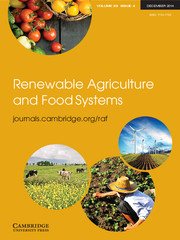Crossref Citations
This article has been cited by the following publications. This list is generated based on data provided by
Crossref.
Schmit, T.M.
and
Gómez, M.I.
2011.
Developing viable farmers markets in rural communities: An investigation of vendor performance using objective and subjective valuations.
Food Policy,
Vol. 36,
Issue. 2,
p.
119.
Spilková, Jana
and
Perlín, Radim
2013.
Farmers' markets in Czechia: Risks and possibilities.
Journal of Rural Studies,
Vol. 32,
Issue. ,
p.
220.
Galt, Ryan E.
2013.
The Moral Economy Is a Double‐edged Sword: Explaining Farmers’ Earnings and Self‐exploitation in Community‐Supported Agriculture.
Economic Geography,
Vol. 89,
Issue. 4,
p.
341.
Silva, Erin
Dong, Fengxia
Mitchell, Paul
and
Hendrickson, John
2015.
Impact of marketing channels on perceptions of quality of life and profitability for Wisconsin's organic vegetable farmers.
Renewable Agriculture and Food Systems,
Vol. 30,
Issue. 5,
p.
428.
Mittal, Anuj
and
Krejci, Caroline C.
2015.
A hybrid simulation model of inbound logistics operations in regional food supply systems.
p.
1549.
Jablonski, B. B. R.
Schmit, T. M.
and
Kay, D.
2016.
Assessing the Economic Impacts of Food Hubs on Regional Economies: A Framework that Includes Opportunity Cost.
Agricultural and Resource Economics Review,
Vol. 45,
Issue. 1,
p.
143.
Krejci, Caroline C.
Stone, Richard T.
Dorneich, Michael C.
and
Gilbert, Stephen B.
2016.
Analysis of Food Hub Commerce and Participation Using Agent-Based Modeling.
Human Factors: The Journal of the Human Factors and Ergonomics Society,
Vol. 58,
Issue. 1,
p.
58.
Abebe, Gumataw K.
Bijman, Jos
and
Royer, Annie
2016.
Are middlemen facilitators or barriers to improve smallholders' welfare in rural economies? Empirical evidence from Ethiopia.
Journal of Rural Studies,
Vol. 43,
Issue. ,
p.
203.
Jablonski, Becca B.R.
and
Schmit, Todd M.
2016.
Differential expenditure patterns of local food system participants.
Renewable Agriculture and Food Systems,
Vol. 31,
Issue. 2,
p.
139.
Farmer, James Robert
and
Betz, Megan Elizabeth
2016.
Rebuilding local foods in Appalachia: Variables affecting distribution methods of West Virginia farms.
Journal of Rural Studies,
Vol. 45,
Issue. ,
p.
34.
Seguin, Rebecca A.
Morgan, Emily H.
Hanson, Karla L.
Ammerman, Alice S.
Jilcott Pitts, Stephanie B.
Kolodinsky, Jane
Sitaker, Marilyn
Becot, Florence A.
Connor, Leah M.
Garner, Jennifer A.
and
McGuirt, Jared T.
2017.
Farm Fresh Foods for Healthy Kids (F3HK): An innovative community supported agriculture intervention to prevent childhood obesity in low-income families and strengthen local agricultural economies.
BMC Public Health,
Vol. 17,
Issue. 1,
Nassivera, Federico
Bassi, Ivana
and
Piani, Lucia
2017.
Determinants of Consumer Behavioral Intention Toward Social Farm Food.
Journal of International Food & Agribusiness Marketing,
Vol. 29,
Issue. 4,
p.
279.
Weil, Rachel
Silva, Erin
Hendrickson, John
and
Mitchell, Paul
2017.
Time and technique assessments of labor productivity on diversified organic vegetable farms using a comparative case study approach.
Journal of Agriculture, Food Systems, and Community Development,
p.
1.
Corsi, Alessandro
Novelli, Silvia
and
Pettenati, Giacomo
2018.
Alternative Food Networks.
p.
173.
Carbone, Anna
2018.
Foods and Places: Comparing Different Supply Chains.
Agriculture,
Vol. 8,
Issue. 1,
p.
6.
Bauman, Allison
Thilmany McFadden, Dawn
and
Jablonski, Becca B. R.
2018.
The Financial Performance Implications of Differential Marketing Strategies: Exploring Farms that Pursue Local Markets as a Core Competitive Advantage.
Agricultural and Resource Economics Review,
Vol. 47,
Issue. 3,
p.
477.
Conner, David S.
Sims, Katherine
Berkfield, Richard
and
Harrington, Hannah
2018.
Do farmers and other suppliers benefit from sales to food hubs? Evidence from Vermont.
Journal of Hunger & Environmental Nutrition,
Vol. 13,
Issue. 4,
p.
507.
Guptill, Amy
Larsen, David
Welsh, Rick
and
Kelly, Erin
2018.
Do Affluent Urban Consumers Drive Direct Food Sales in the Northeast United States? A Three-part Analysis.
Journal of Agriculture, Food Systems, and Community Development,
p.
1.
Trant, Lindsay
Brekken, Christy
Lev, Larry
and
Gwin, Lauren
2018.
Implications of the 2016 Oregon Minimum Wage Increase for Direct Market Farmers, Farmworkers, and Communities.
Sustainability,
Vol. 10,
Issue. 2,
p.
370.
Sitaker, Marilyn
McGuirt, Jared T.
Wang, Weiwei
Kolodinsky, Jane
and
Seguin, Rebecca A.
2019.
Spatial Considerations for Implementing Two Direct-to-Consumer Food Models in Two States.
Sustainability,
Vol. 11,
Issue. 7,
p.
2081.


